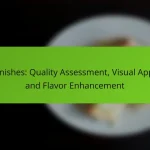Choosing between a themed and a traditional cocktail menu can significantly impact the atmosphere of your event. Themed menus are perfect for occasions that thrive on creativity and unique concepts, while traditional menus cater to those seeking a classic and refined experience. Understanding the context and goals of your event will help determine which option will best engage your guests and enhance their overall experience.
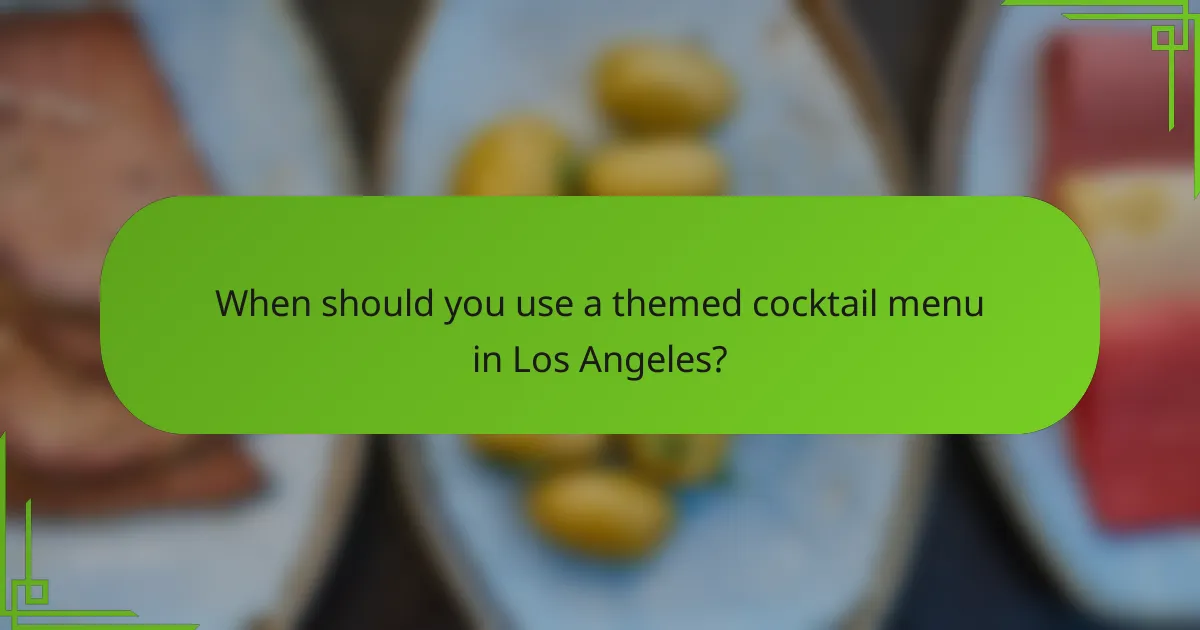
When should you use a themed cocktail menu in Los Angeles?
A themed cocktail menu is ideal for events or occasions that benefit from a unique atmosphere or concept. In Los Angeles, where creativity and experience are highly valued, themed menus can enhance guest engagement and create memorable experiences.
Special events and parties
Themed cocktail menus are particularly effective for special events and parties, such as weddings, birthdays, or corporate gatherings. They can be tailored to reflect the event’s theme, making the experience more cohesive and enjoyable for guests. For instance, a Hollywood-themed party could feature cocktails named after classic films or iconic stars.
Consider the guest demographic and the event’s purpose when designing the menu. A well-curated selection can elevate the overall atmosphere and encourage attendees to try new drinks, enhancing their experience.
Seasonal promotions
Seasonal promotions provide an excellent opportunity to introduce themed cocktail menus. For example, summer menus can highlight refreshing, fruity cocktails, while winter might focus on warm, spiced drinks. This approach not only keeps the menu fresh but also aligns with seasonal festivities and trends.
In Los Angeles, consider incorporating local ingredients that reflect the season, such as fresh citrus in summer or warming spices in winter. This not only enhances flavor but also supports local farmers and producers.
Branding opportunities
A themed cocktail menu can serve as a powerful branding tool, allowing establishments to showcase their unique identity. By aligning cocktails with the brand’s story or aesthetic, bars and restaurants can create a distinctive experience that resonates with customers.
For example, a bar focused on sustainability might offer a menu featuring eco-friendly cocktails made with organic ingredients. This not only attracts like-minded patrons but also reinforces the brand’s commitment to environmental responsibility.
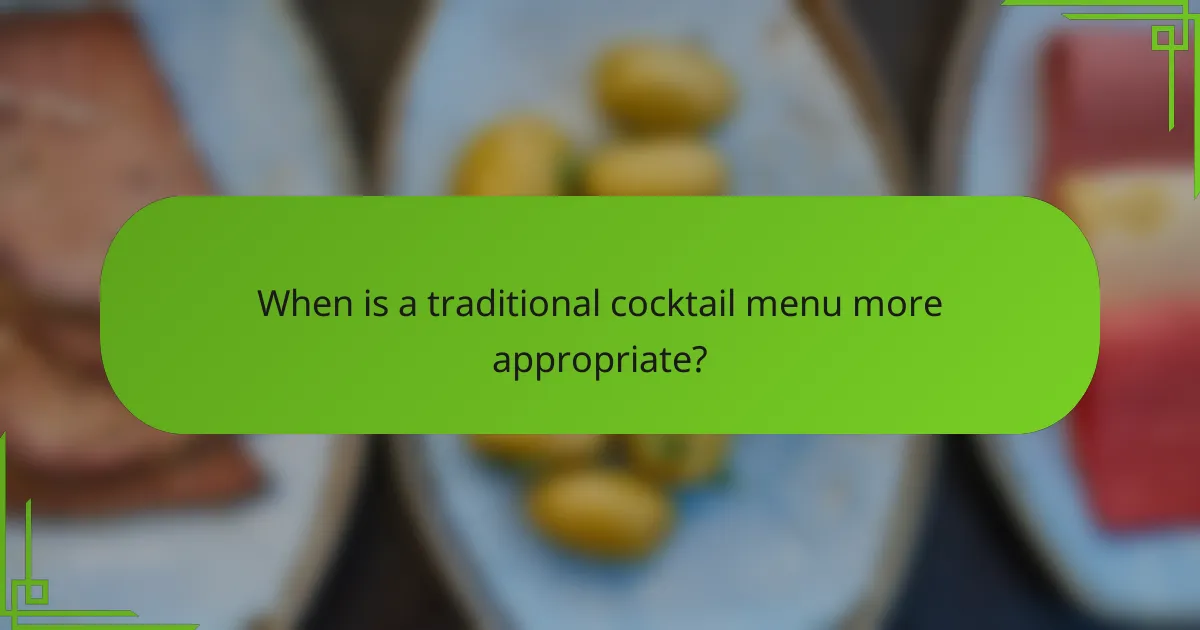
When is a traditional cocktail menu more appropriate?
A traditional cocktail menu is best suited for events that require a classic and refined atmosphere. These menus typically feature well-known cocktails, appealing to a wide range of tastes and ensuring familiarity for guests.
Formal gatherings and weddings
At formal gatherings and weddings, a traditional cocktail menu enhances the elegance of the occasion. Classic drinks like martinis, old fashioneds, and cosmopolitans are often preferred, as they resonate with the sophisticated ambiance. Offering a selection of timeless cocktails can help create a memorable experience for guests.
Consider including signature cocktails that reflect the couple’s personality or theme, while still maintaining a core selection of traditional options. This balance allows for personalization without straying too far from the expected norms.
Corporate events
Corporate events often call for a traditional cocktail menu to maintain professionalism and cater to diverse preferences. Drinks such as gin and tonics, whiskey sours, and mojitos are popular choices that appeal to a broad audience. A classic menu can help foster a comfortable environment for networking and collaboration.
When planning a corporate event, ensure that the cocktail offerings align with the company’s brand and values. Providing a few non-alcoholic options alongside traditional cocktails can also accommodate all attendees.
Established venues
Established venues, such as upscale bars and restaurants, typically benefit from a traditional cocktail menu that reflects their reputation. Patrons expect a selection of classic drinks that showcase the venue’s expertise and commitment to quality. This approach can enhance customer loyalty and attract new clientele.
To maintain relevance, these venues should periodically review and update their traditional offerings, incorporating seasonal ingredients or local spirits while keeping the core classics intact. This strategy keeps the menu fresh and appealing without alienating loyal customers.
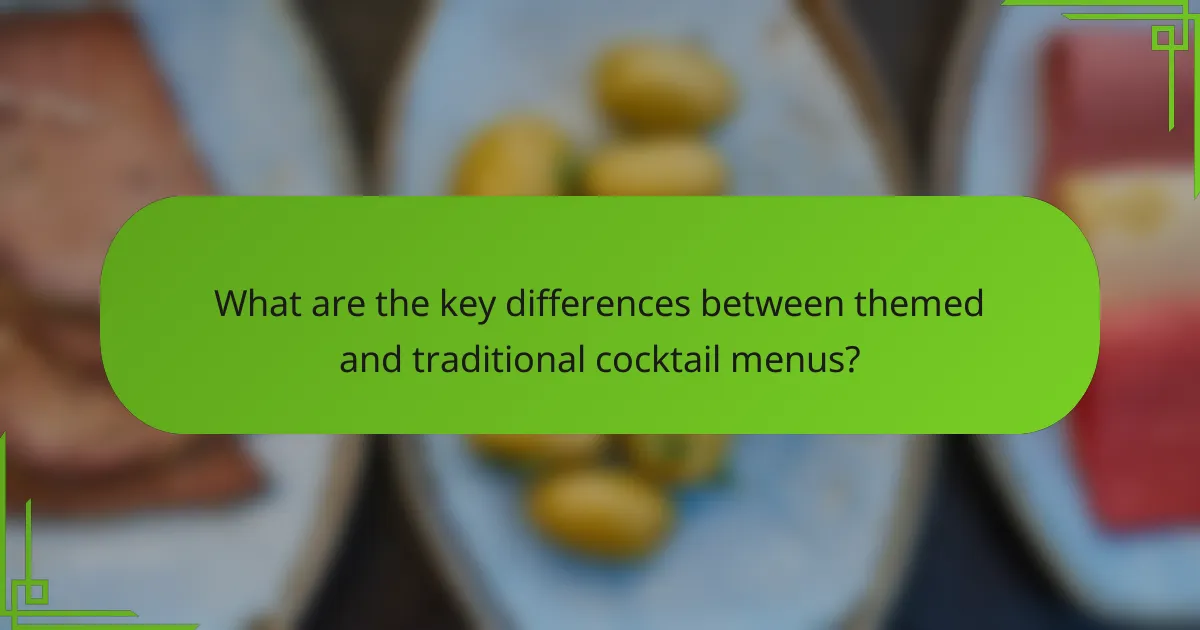
What are the key differences between themed and traditional cocktail menus?
Themed cocktail menus focus on a specific concept or idea, while traditional menus offer a broader selection of classic drinks. Themed menus often enhance the drinking experience by aligning with events or seasons, whereas traditional menus provide familiarity and consistency.
Creativity and presentation
Themed cocktail menus allow for greater creativity in both drink recipes and presentation. For instance, a Halloween-themed menu might feature cocktails with spooky names and garnishes, such as “Witch’s Brew” with dry ice for a smoky effect. Traditional menus, on the other hand, emphasize classic cocktails with established recipes, which may limit innovative presentation.
When designing a themed menu, consider how the visual elements, such as glassware and garnishes, can enhance the overall experience. Unique presentations can attract attention and encourage social media sharing, which is beneficial for marketing.
Customer engagement
Themed cocktail menus can significantly boost customer engagement by creating a memorable experience. Patrons are often drawn to unique themes, which can lead to increased interest and interaction with staff. For example, a summer beach theme might inspire customers to try refreshing cocktails that evoke a vacation vibe.
In contrast, traditional menus may not generate the same level of excitement, as they typically feature familiar options. However, they can appeal to customers seeking reliability and classic tastes, making them a safe choice for many establishments.
Menu complexity
Themed cocktail menus can introduce complexity due to the need for specialized ingredients and unique recipes. This complexity can lead to increased preparation time and potential challenges in inventory management. For example, a holiday-themed menu may require seasonal ingredients that are not always readily available.
Traditional menus tend to be simpler, focusing on well-known cocktails that require standard ingredients. This simplicity can streamline operations, making it easier for bartenders to prepare drinks quickly and efficiently. Consider your staff’s skill level and the availability of ingredients when deciding on the type of menu to implement.
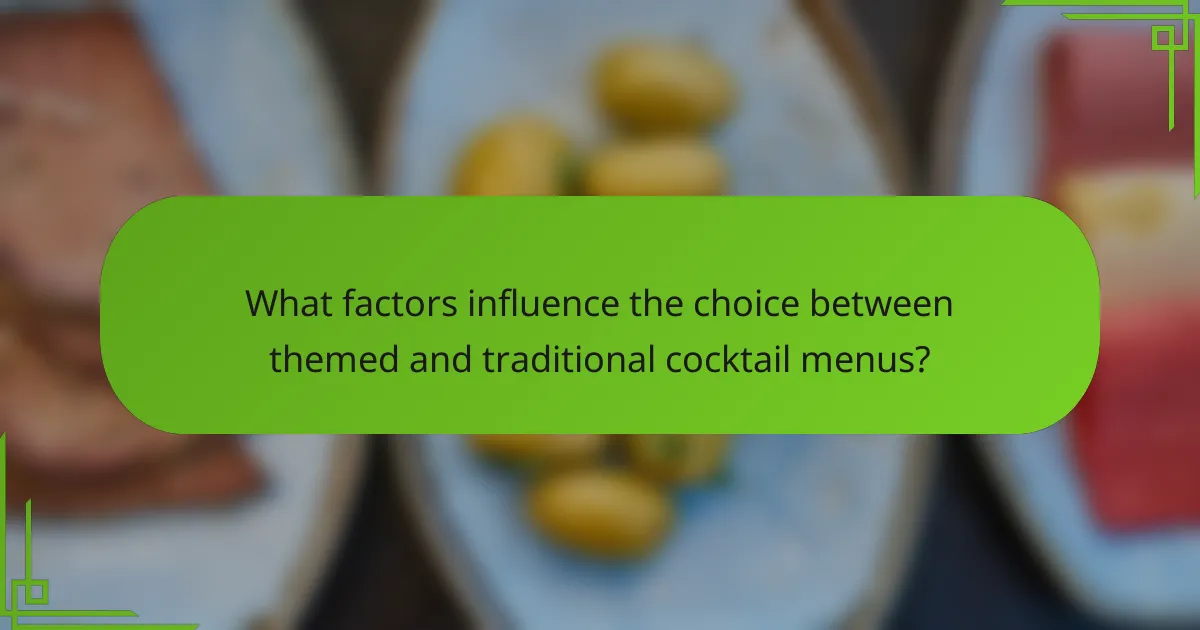
What factors influence the choice between themed and traditional cocktail menus?
The choice between themed and traditional cocktail menus is influenced by several key factors, including the target audience, the type of event, and budget constraints. Understanding these elements helps in selecting the most suitable menu style for any occasion.
Target audience preferences
Knowing your audience is crucial when deciding between themed and traditional cocktail menus. For instance, a younger crowd may appreciate creative and visually appealing themed cocktails, while a more mature audience might prefer classic drinks with a sophisticated touch.
Consider conducting a survey or informal poll to gauge preferences. This can help tailor the menu to align with guests’ tastes, ensuring a more enjoyable experience.
Event type and atmosphere
The type of event significantly impacts the choice of cocktail menu. Formal events, such as weddings or corporate functions, often benefit from traditional menus that feature well-known cocktails. In contrast, casual gatherings, like birthday parties or themed celebrations, can be enhanced with unique, themed drinks that match the event’s vibe.
Think about the overall atmosphere you want to create. A relaxed beach party might call for fruity, tropical cocktails, while a winter gala could favor warm, spiced drinks. Aligning the menu with the event’s theme enhances guest enjoyment.
Budget considerations
Budget plays a vital role in determining the cocktail menu style. Themed cocktails may require specialized ingredients or unique garnishes, which can increase costs. Traditional cocktails, on the other hand, often use more readily available ingredients, making them a cost-effective option.
When planning, outline your budget clearly. Consider offering a limited selection of themed cocktails alongside traditional options to balance creativity with cost. This approach can provide variety without overspending.
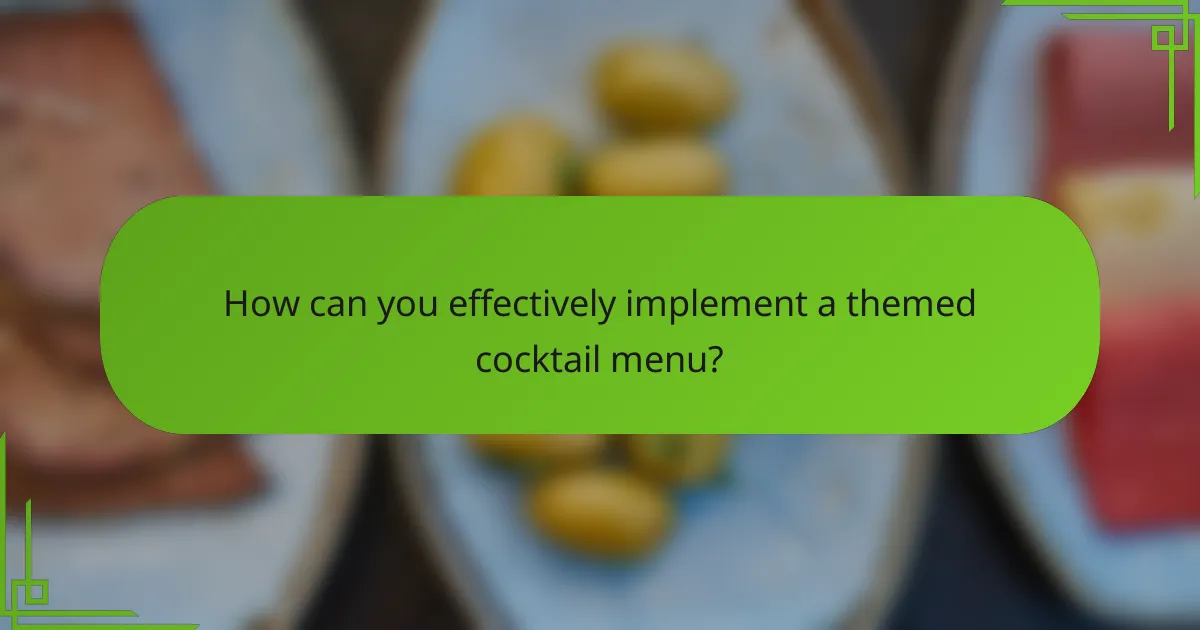
How can you effectively implement a themed cocktail menu?
To effectively implement a themed cocktail menu, focus on creating a unified experience that resonates with your target audience. This involves selecting a theme that aligns with your venue’s identity and ensuring that every aspect, from drink names to presentation, reflects that theme.
Designing cohesive themes
Start by choosing a theme that complements your bar’s atmosphere and clientele. Popular themes include seasonal ingredients, cultural inspirations, or even popular movies and books. Ensure that each cocktail not only fits the theme but also offers a unique flavor profile that enhances the overall experience.
Consider using consistent visual elements, such as glassware and garnishes, to reinforce the theme. For example, a tropical theme might feature colorful cocktails served in tiki mugs with fresh fruit garnishes. This attention to detail can elevate the guest experience and encourage social sharing.
Training staff on themed offerings
Training your staff is crucial for the successful execution of a themed cocktail menu. Ensure that bartenders are well-versed in the ingredients, preparation methods, and stories behind each cocktail. This knowledge allows them to engage with customers and provide recommendations confidently.
Conduct regular tastings and role-playing scenarios to familiarize staff with the themed offerings. This practice not only boosts their confidence but also helps them to convey enthusiasm, which can significantly enhance customer satisfaction.
Marketing the themed menu
Effective marketing of your themed cocktail menu can attract new customers and create buzz. Utilize social media platforms to showcase visually appealing images of the cocktails, along with engaging descriptions that highlight the theme. Consider hosting launch events or themed nights to draw in crowds and create a memorable experience.
Collaborate with local influencers or bloggers to promote the menu, as their endorsements can reach a wider audience. Additionally, consider offering limited-time specials or discounts to encourage patrons to try the new offerings, creating a sense of urgency and excitement around the theme.
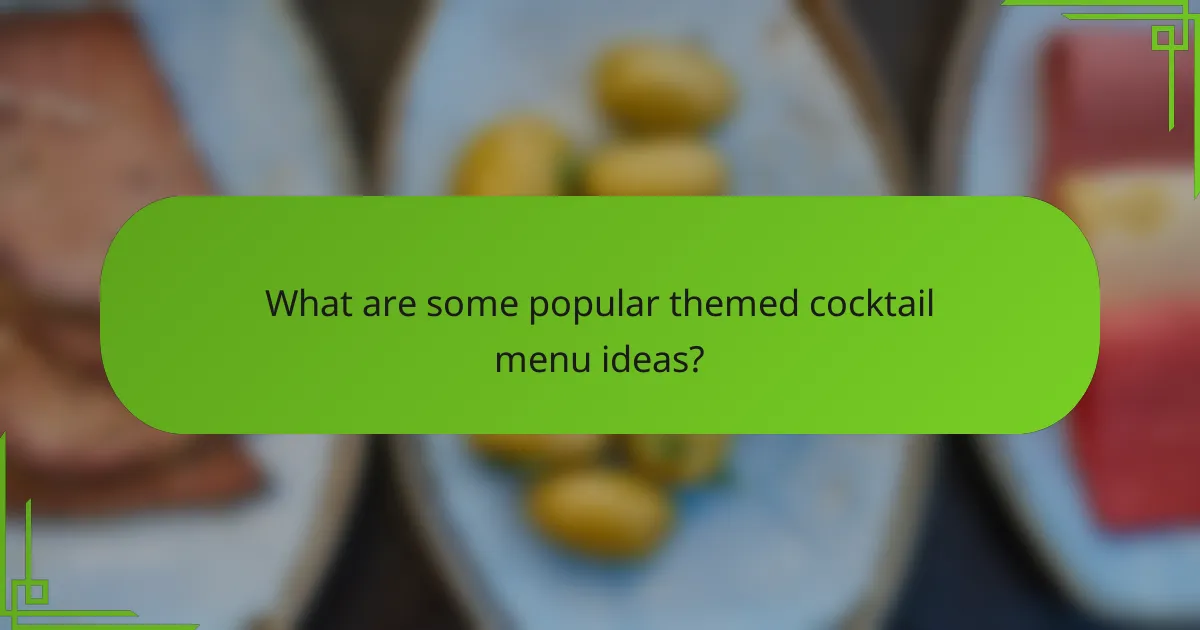
What are some popular themed cocktail menu ideas?
Popular themed cocktail menu ideas often revolve around specific concepts, seasons, or cultural references. These menus can enhance the drinking experience by creating a cohesive atmosphere and encouraging creativity in drink selection.
Seasonal themes
Seasonal themes for cocktail menus capitalize on the ingredients and moods associated with different times of the year. For instance, summer menus might feature refreshing drinks with fruits like watermelon and citrus, while winter menus could highlight warm spices and rich flavors like cinnamon and nutmeg.
When creating a seasonal cocktail menu, consider the local climate and available ingredients. A summer menu in a tropical region may include light, fruity cocktails, while a winter menu in a colder area might focus on hearty, warming drinks. Aim for a balance of flavors and textures to cater to diverse palates.
Common pitfalls include relying too heavily on generic seasonal themes without local adaptation. To avoid this, research local preferences and seasonal produce, ensuring your menu feels fresh and relevant. A well-curated seasonal menu can attract customers looking for unique and timely experiences.


